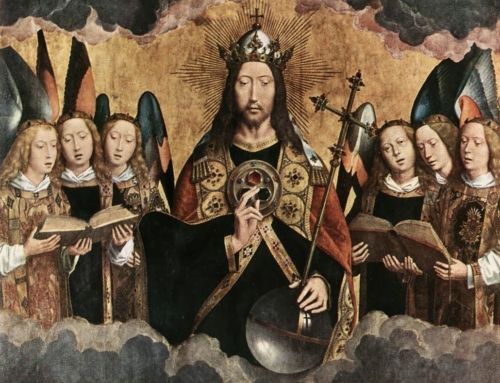If you’re searching for the meaning of life, I’ve been thinking lately that there are really only three options.
The first option is nihilism. That is, that there is no meaning of life and the search for meaning if a fool’s errand, a wild goose chase, a pointless quest. If that is your point of view, then I guess you might as well stop reading this post right now and go make a sandwich.
However, if you believe there is some meaning to life, then there are two choices: faith or an ideology.
When I say “faith” I mean a particular kind of religious response to the mystery of life. I’ll explain more about this eventually, but I should say up front that the “faith” option is not simply the Catholic faith. I believe the Catholic faith is the fullest and most true and wonderful expression of the faith option, but there are many other forms of the faith option.
The third choice after nihilism and faith is an ideology. An ideology is any belief system which is adhered to unquestioningly and provides the matrix through which everything else is perceived and understood. An ideology is almost always linked with a legalistic understanding of human behavior. There is not only a set of beliefs which must be adhered to, but there is also a subsequent set of behaviors that are expected. Furthermore, the mark of an ideology is that those who follow it feel obliged to impose it on others. They logic goes like this: if their belief system and behaviors are the right ones, then it follows that other people should adopt those beliefs and conform to those behaviors.
Ideologies are everywhere. Some of them are formal and recognizable like Marxism, radical feminism, Nazism or White Supremacism. There are more ideologies, however that are cultural. These ideologies are woven into a culture more imperceptibly though media, education and cultural assumptions. So, in the USA, for example the ideology of human rights as the highest virtue is engrained in everything from legislation through to the assumptions of education, the media and everyday business dealings. Don’t get me wrong, a belief is not necessarily false just because it has become an ideology. Indeed, the most effective ideologies are based on beliefs that are true and good. They become ideologies when those truths are taken on their own or are out of balance or they are used to negate other truths.
What really makes this interesting to me is that religions can very easily become ideologies.
Indeed, when reading the definition of an ideology as a belief system which gives meaning to everything else and which has a prescribed set of behaviors, many people would conclude that all religions are like this. In fact, every religion has a group of people within it who have turned their religion into an ideology. They have defined their religion by the set of beliefs and expected behaviors and if a person does not subscribe to those beliefs and conform to those behaviors they are outcasts.
And religion might be twisted into an ideology, and it is true that some religions are nothing but an ideology, but a religious ideology is not faith.
Faith is the third option. Faith is an open ended adventure with questions, failures, faults and risk. Faith is life. It is open. It is free. It is dangerous. Ideology closes all that down in favor of set beliefs and behaviors. Faith is wave walking. Ideology is staying safely in the boat.
Faith is Frodo saying, “I will take the ring to Mordor…but I do not know the way.”
There is little the ideologue hates more than faith because faith is subversive. It challenges the set beliefs and expected behaviors and calls the person out to do something far more adventurous. That is why Jesus told his disciples they needed to be far better than the Pharisees and Scribes. The Pharisees and Scribes were locked into an ideology of set beliefs and behaviors. The disciples had to be better than that.
The idealogue hates and fears faith because faith threatens to subvert the system–offering freedom in the face of legalism and questions in the face of set beliefs.
Does this mean the person of faith is in favor of complete personal freedom and the anarchy of individualism?
No. Faith needs set beliefs and behaviors, but the person of faith sees these things for what they really are–a means to an end, not an end in themselves. The set beliefs and expected behaviors are like the rule book for the game. You must have the rules and obey the rules, but it is the game that matters. The set beliefs and behaviors are the music written on the page of the score. The musician must observe the written rules of the music and play it perfectly, but to really pay the music the great musician transcends the written music on the page. He uses the written music as a springboard to leap into producing true music–not just the notes on the page. The set beliefs and behaviors are the words and directions in a play. They are given by the playwright, and observed by the actors and director, but they use the words and stage directions as the means to produce the play itself.
There are then two choices: Faith or an Ideology. Time and time again the human failure in the realm of religion is to twist faith into an ideology. This occurs within Catholicism to be sure, but it also occurs in just about every religion. Every Christian denomination and every world religion has adherents who twist what could be a dynamic way of faith into a system of beliefs and behaviors. The sign that they have done this is that they not only wish to keep to the beliefs and behaviors themselves, but they castigate and condemn everyone who refuses to join them in their ideology and they attempt to impose their ideology on everyone else.
In the end, every ideology is begun, continued and ended in pride. It is the pride of the person who believes they have found the true path and that they must keep to it and bring as many others to follow it as possible. This pride cannot bear correction, and it is the direct antithesis of faith. Faith, on the other hand, is always seeking, always learning, always laughing at itself, always searching for the beauty, truth and goodness in the world, in others and in God himself.
Faith, if you like, is the great adventure.
An ideology is staying at home and locking the door.







Thank you, Father. Tremendous insights and analogies that I need to embrace as a personal warning. Scrupulosity versus the freedom of the children of God. As the Gospels declare, Jesus castigated the Pharisees, the ideologists of their day.